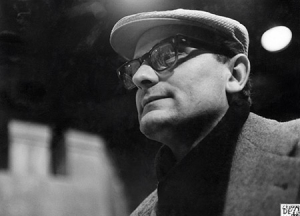Biography
Director Siegfried Hartmann who is mainly known for his children's and fantasy films was born October 15, 1927, in Liegnitz, Silesia (today: Legnica, Poland). After finishing high school, he was drafted for "Reichsarbeitsdienst" and was deployed to Deutsche Wehrmacht shortly after. At the end of the war, he was captured by US soldiers and became a prisoner of war but was soon released as a minor. He then travelled by foot nearly 650 kilometers from Austria to Halle where his parents had fled to in 1945.
At first, Hartmann struggled along with occasional jobs. In 1946, he gained access to the media business as a trainee in the press and propaganda department in the editorial offices of the provincial administration of Saxony that later became the Landesnachrichtenamt of the state government of Saxony-Anhalt. There, Hartmann was trained until 1948 and worked for "Das klingende Filmmagazin" of Mitteldeutscher Rundfunk and for Berliner Rundfunk, among other stations.
After his traineeship, he started an apprenticeship at DEFA-Nachwuchsstudio. From 1949 to 1951, he was trained as an assistant director by DEFA filmmakers like Konrad Petzold and Walter Beck. From 1951 on, Hartmann worked as an assistant director at DEFA-Studio für Spielfilme. Until 1956, he collaborated with directors like Kurt Maetzig and Wolfgang Staudte, among others. At the same time, he gained experience for directing his own film projects at DEFA's studio for popular scientific films. Until 1955, Siegfried Hartmann finished about 20 popular scientific documentary films.
In 1957, Hartmann got a job as a director at DEFA-Studio für Spielfilme. His first film, "Fiete im Netz" (1958), a story about a boy who observes two rowdies doing a disgraceful deed and who keeps quiet about his observation for a long time out of fear – and because the rowdies bribe him – did not receive favorable reviews. Functionaries and critics accused the film of political indifference and furthermore missed the representation of the socialist pioneer organization's positive appeal. Thus, Siegfried Hartmann's debut film was practically banned from public screening until 1989.
But Hartmann's reputation improved considerably with his second film, the fantasy film "Das Feuerzeug" ("The Tinder Box", 1959). The film version of a fairy tale by Hans Christian Andersen delighted critics and movie goers alike with its entertaining, yet sensitive realization and its worth seeing special effects. With altogether more than five million viewers, the film is considered to be one of the most successful fantasy films of GDR film history. The leading role was played by popular actor Rolf Ludwig.
For 20 years, Siegfried Hartmann mainly finished children's and fantasy films that received positive reviews by the majority. His films include the oriental story "Hatifa" (1960), based on Willi Meinck's story by the same name about a young girl that tries to free herself from slavery, the magnificently decorated fantasy film "Die goldene Gans" ("The Golden Goose", 1964), based on a story by Brothers Grimm, the film version of the childrens book "Der kleine Kommandeur" (1972) about a six-year old's trip to Berlin, and another film version of a classic fairy tale, "Schneeweißchen und Rosenrot" (1978). Hartmann mainly shot the film at outdoor locations instead of in the studio. It was his last film for the movie screen.
During the 1980s, Hartmann switched from directing to screenplay writing. He, for instance, wrote the screenplay to the fantasy film "Rapunzel oder Zauber der Tränen" (1988) that was directed by Ursula Schmenger. Until 1991, he had a contract with DEFA.
Siegfried Hartmann died March 17, 2025 in Berlin, age 97.
